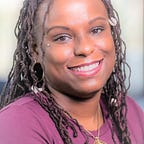This is America: The Normalization of Mass shootings, and the Dismissal of Black pain.
By Jacquelyn Ollison, Ed.D. and Gibran Mims
On Saturday, May 14, 2022, 10 African American people were slaughtered by a white domestic terrorist. All weekend my emotions, mind, and spirit reeled in grief. I was, and still am, angry, disappointed, sad, and hopeless. On Monday, I went to work, and it was business as usual.”How was your weekend?” I smiled and said, ‘Great, how about you?’ But inside, I felt invisible.
High-profile murders of Black people are so commonplace that people don’t even bother mentioning them anymore. And that is what opens and reopens the deep wound of racism in this country. The pain caused by the slaughter of Black lives and people of color is normal. I question if the normalization of white supremacy, mass shootings, and Black pain explains why Black lives are treated as disposable in our country. Racially motivated hate crimes like this keep happening, and nothing changes, especially the gun laws. This is America.
There is a lot of talk about equity, inclusion, and belonging, especially from the education policy perspective. But equity, inclusion, and belonging don’t always have to be a big shift in policy; it could be as simple as acknowledging one’s racial identity and the pain their community might be experiencing due to racially traumatic events like the Buffalo shooting. A little bit goes a long way.
Research shows that Black children experience microaggressions and racism daily, yet they’re resigned to swallowing their pain rather than seeking help because nothing ever changes. Black students have come to see the disrespect for their humanity as normal. And all other students (e.g., White, Asian, Latinx) see this disrespect as normal too. Which in part has led to California’s Black youth suicide rates being twice the state average. And what makes racially motivated mass murders possible. All of this is what results from normalizing white supremacy, racism, and dismissing Black pain. It’s easy to feel lost, hopeless, or like giving up.
When I feel hopeless, I draw on the legacy of ancestors who faced adversity head-on and still managed to rise — to overcome. In 2022, we should not be doing this alone. We are each other’s medicine. So please, check in on your friends. Check on your coworkers. Check on your students. Check on your teachers. Just because you’re not mentioning or even acknowledging the pain terrorist acts like this cause doesn’t mean people aren’t hurting or bothered. Better yet, take a moment and think about the kind of support you would want if this mass shooting happened in your community? When you know the answer to that question, do that for others.
Authors’ note: We originally wrote this blog to address the Saturday, May 14, 2022, Buffalo Massacre, but by the time we were ready to post and share it with you, another mass shooting that left 19 students and two teachers dead took place on Tuesday, May 24, 2022, in a Texas elementary school. It feels like hopelessness is a permanent presence these days.
About the Authors:
Jacquelyn is an Education Leader, Professor, Equity-centered Advocate, & Courageous Agent of Change
Gibran is a recent college graduate from San Diego State University and the current program coordinator for the CDE Foundation. He is passionate about elevating the voices of students of color and hopes to influence change towards achieving a more racially equitable society.
